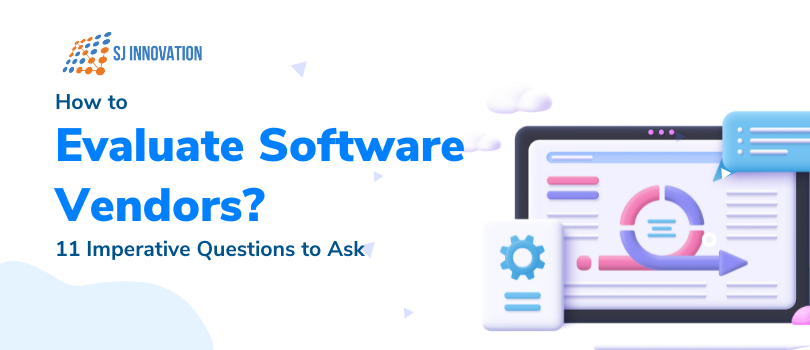How to Evaluate Software Vendors? 11 Imperative Questions to Ask

How to evaluate software vendors? This question is bound to cross your mind especially if the project is particularly complicated and needs the collaboration of many software developers on board.

But, you may ask, “Even still, why is it so perplexing?”
Well,
At times, the individuals selecting software vendors themselves have very little technical information or experience to ask them the right questions.
Many software vendors also only scratch the surface when listening to your project requirements, offer a rough timeline, and an estimate. However, they don’t dive in deeper. The result? In the digital customer engagement space, many companies make huge claims about scalability, but during times of high activity, fail to deliver.
Do you see what hinges on having the right software vendor by your side? If you need us to throw more light on the subject, here are 11 imperative questions you must ask software vendors so you can discern the most trusted software providers before signing any contract.
1) Does the vendor understand your tech stack?

The vendor must be familiar with your specific tech stack. After all, the software set that you are making use of offers the infrastructure for the system.
- Know whether the vendor can work functionally with your tech stack or if they are suggesting you go in for a more trending technology.
- A qualified and skilled vendor will make certain that the developed software functions perfectly within the tech stack and offers a flawless outcome.
2) Does the vendor cope well when a team member leaves?

It’s one of the important questions to ask when assessing vendors. Why? Because developing software is a team effort and specific project requirements are handled by specific members. Without the consolidated effort of the entire team, the final product will lack that professional finishing and quality.
- In the best software consulting companies, every individual in a team works together to get familiar with and understand features, the codebase, and other necessities for the smooth sailing of a project.
- The vendor needs to have a well-thought-of action plan to effectively manage the project even when a team member leaves.
3) How experienced is the vendor?
It’s always recommended to work with a vendor who has been in business for more than five years.
- Remember, the greater the experience, the more advantageous for you.
- Collaborating with a vendor that has an enhanced skill set and knowledge base over a longer time ensures they can manage issues that crop up effectively.
- Vendors with less than five years of experience may highlight that they are well versed with the latest technology but take note, building software is not the same as developing a simple website.
4) How many part-time and full-time employees exist?
Does the software vendor employ contractors for every project or do they have permanent employees? When contract employees leave a project, they also take the knowledge with them and go.
- Without a good knowledge transfer procedure, obtaining support becomes an obstacle.
- With the coming and going of part-time employees, new people have to deal with the learning curve which can delay processes.
5) What are the goals, values, and what drives the software vendor?

No, culture and values aren’t just a marketing strategy you can conveniently ignore. For quality software solutions in development:
- The cooperation of all members for a long duration of time is important. (after all, you need to take into account the time allotted to development, maintenance, fixes, and updates).
- Aligning with the vendor’s values and goals is important or else, your time will only be spent quarreling and resolving arguments.
6) Are there references you can get in touch with?

While there are technical questions to ask when implementing new software, case studies of customers who have liked a software vendor’s product can be helpful, especially when it resembles your company’s customer base, size, industry, and geography.
- It gives a fair idea of what you can expect from your product by helping you check out facts and examples.
- It affirms that the vendor is equipped with the skillset to complete your project’s needs.
7) Is the software vendor reliable and trustworthy?

The best software vendors are those you can trust with your data.
- Make sure you ask the software vendor about data security beforehand and be sure to check up on earlier client reviews and success stories.
- Accordingly, you can follow a systematic data security procedure that works successfully at the vendor’s site.
8) What happens if the software vendor fails to deliver?
In this scenario, a majority of software vendors will beat around the bush but make sure you understand the response to this question well! After all, mishaps occur in software project plans ever so frequently.
- Ask questions about how the vendor will manage any kinds of risks involved.
- If the vendor gives the impression that they don’t encounter problems or if they are purposely vague about it, reconsider your software vendor.
- Go in for a vendor who has a steady disaster recovery plan in place.
- A good vendor has a proper risk management plan and puts their vast knowledge and experience to contain and mitigate the problem.
9) What is the quality assurance procedure like?

How Software Quality Assurance Services is vital to different industries in 2022 is no secret. During software development, quality assurance teams come up with rules and standards after continuous testing to ensure the software’s quality meets the client’s requirements.
- Understand what assurance exists in case the finished software does not meet the required standards.
- Enquire whether the company provides insurance for large projects with risk or whether it manages security breaches, errors, and ransom attacks among others.
10) What is the deadline and software estimate like?

Timeline and rate structure are always a bit confusing as sometimes, additional features are added during the information or build stage that may not be offered when the process started. So make sure to get accurate clarifications on this as cost overruns and missed deadlines are quite a normal phenomenon.
- Obtain a rate structure and timeline that is decided upon well in advance but see that there is space left for any unexpected issues.
- The account manager should offer weekly or bi-monthly progress reports so everyone is in the loop of the next stage.
11) Who will you be interacting with throughout the shelf life of the project?

When you need assistance or information about a specific topic, whom can you contact?
It’s a pretty common question but you’ll be surprised how often customers overlook it.
- Have a clear idea of who will be communicating with you during the entire project.
- Know whom you can get in touch with when you have an urgent query that needs attention.
- Know the point of contact beforehand so you know who to interact with, in case you find a bug or are looking to give a demo to a potential lead.
Other essential questions
Is interacting with another client who has previously been using your services possible?
This acts as a testimony to how well the vendor has been of service to previous clients.
Who owns the code?
Each software vendor has its policy so while mostly, the contracting company owns the code, it’s vital to examine all this before signing an agreement.
Would they need to sign an NDA before learning information about the project?
If an NDA isn’t signed, the original idea you thought of can be stolen. Stay away from vendors who don’t have or do not want to sign an NDA.
How can the vendor be contacted?
Get acquainted with how you can get in touch with the vendor, especially outside business hours.
Choosing a software vendor is a double-edged sword. Either it’s a promising start to a wonderful partnership or a hectic cat and mouse chase filled with failures and empty promises that cannot be delivered.
So when wondering how to evaluate software vendors? Go ahead and make sure you ask the right questions.
Think we missed out on a few questions on the checklist to follow on how to evaluate software vendors? Let us know!

At the Heart of SJ Innovation: How we Coordinate our International venture

FRIDAY FUN ACTIVITY : A MUST AT EVERY WORKPLACE


